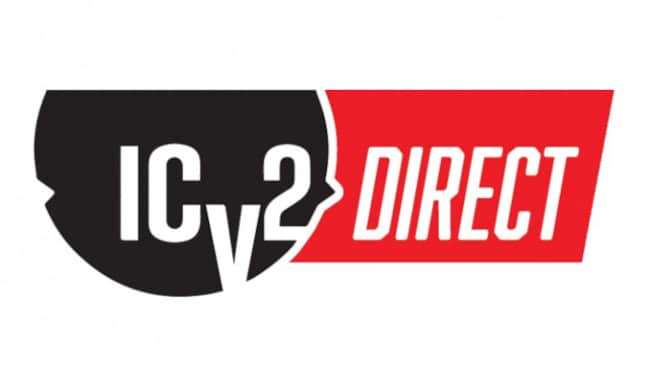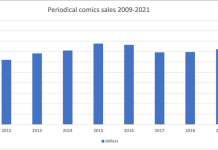While we have our BookScan numbers for sell through, and our Diamond estimates of sell-in in comics shops, we haven’t had reliable sell THROUGH numbers for what periodical comics actually sell to customer in stores. Retailers ave POS (point of sale) systems (although not all do) but aggregating them is a closely held industry secret.
But that may be changing. According to NPD Book Executive Director, Business Development Kristen McLean Bookscan is teaming with Diamond to start tracking more LCS sales:. In a report at ICv2 she says:
Kristen McLean: We are very excited about Comics and Graphic Novels here at NPD. In the coming year, NPD BookScan and the larger NPD Books Group is putting Comics and Graphic Novels at the center of a big initiative that includes projects like adding Local Comic Shop data to BookScan in partnership with Diamond Comics and the indie retailers, and developing a new License Reporting Service in BookScan that will allow many types of licenses and IP franchises including Comic franchises to be tracked and trended in BookScan for the first time.
This will mean that for the first time, someone who is interested in seeing how Batman is doing can look at the brand health of Batman across all publishers and books being sold in BookScan. Eventually, our vision will be to expand that view to include other entertainment categories like toys, gaming, and movies/home entertainment.
In addition, we’re interested in studying the consumer market for Comics and Graphic Novels for the first time. How are online buyers different from LCS buyers, and different from traditional bookstore Our goal is to create compelling new views and insights for our many clients including Publishers, Retailers, Toy Companies, and Industry Partners—insights and excitement that will continue to fuel the tremendous growth in this category.
NBD acquired BookScan – which tracks book sales at 70-80% of retail outlets – earlier this year from Nielsen. It looks like they have some big plans to add to their data offerings.
Unfortunately for us a the Beat, it also costs a small fortune to subscribe to Bookscan numbers, so these will only be available to the general public via leaks or philanthropy, but one way or another this will add a whole new level to sales chart and arguing and finally give the consumer some voice in what sells at comics shops!
McLean will be speaking about this in greater detail at the Icv2 NYCC Insider Sessions at NYCC on Thursday. Get your tickets and your popcorn now!








So does this mean that Brian Hibbs’ annual Bookscan column is going to get even more interesting?
It will be interesting if they have views for different markets (Book store, DM Retailer, Online) and then everything together.
This will finally clamp down on Marvel’s fuckery with overshipping books to inflate their Diamond numbers. I’ve been curious if that behavior is actionable by the SEC because Disney is publicly traded and Marvel management could be using that tactic to deliberately mislead investors as to the brand’s health and performance.
Will terrible Marvel sales figures on Bookscan prompt Disney to actually do something about them?
What needs to be reported are online sales; Amazon, ComiXology,etc. Does anyone report those sales, or do they not matter in the health of a comic? We are in the digital age, even with comics.
@Joe
Probably not until Q3 2019 when Iger’s contract runs out as CEO of Disney. He seems more than content with all of their subsidiaries running themselves straight into the ground. ESPN’s in trouble, Marvel’s in trouble. Maker Studios has done nothing to warrant their purchase price.
I predict a dip in Disney’s stock price when the 1st set of Bookscan numbers hit Wall St. Whether or not the dip will be enough to get the board’s attention prior is another story. They just love Iger for some stupid reason.
“I’ve been curious if that behavior is actionable by the SEC…”
Certainly not, because the Top 300s are clearly labeled as the number of comics shipped to retailers, and it accurately reports that. It is also easily discernible when books are shipped for less than their usual rate.
As to digital, our annual report with ICV2 finds nonsubscription digital comics sales to be about one-twelfth of the business.
I’d been wondering if they’d ever expand GN tracking into comics shops. Periodicals — well, there have been several pilot programs looking at sell through over the years (including one of mine), and it’s was never clear how much value the findings added. We would want to continue to know the number of copies shipped in any event, because the books are nonreturnable and the aftermarket depends on that information.
“I predict a dip in Disney’s stock price when the 1st set of Bookscan numbers hit Wall St.”
This statement massively over-inflates the importance of Marvel’s periodical business through comic shops to the overall fiscal health of the giant Disney corporation. Something like ESPN impacts Disney’s stock price because of the sheer scale of ESPN’s expenses vs. revenue coupled with a multi-year trend line there. Even in good years, Marvel’s publishing revenue is a much smaller drop in the bucket than something like ESPN, and total revenue from all things Marvel (including movies and merchandising) is strong.
To the extent that Marvel publishing is reflected in the price of Disney stock, it is hard to imagine that the Bookscan numbers will persuade stock traders to behave substantially different than they are already in response to the Diamond shipping numbers. Anybody who is pricing Disney stock as a function of Marvel publishing’s performance is already looking at the Diamond numbers and knows all of the caveats and tricks that go into them.
Marvel news never affects my Disney stock.
On the other hand, Trump tweeting about the ESPN reporter did drop it for a couple days.
The other thing to remember is that the Bookscan numbers from Diamond retailers won’t really tell us much about Marvel’s revenue (or any other publisher’s revenue, for that matter) from periodical comics that we don’t already know. The revenue that Marvel gets from their periodicals is represented by the numbers of books shipped by Diamond (with the usual caveats of overshipping and returnable items).
The Bookscan numbers will tell us more about aggregate revenue to Diamond retailers. By the time a comic arrives at a Diamond retailer, a publisher has already received their revenue from the book. Whether or not the retailer sells that book to a customer (and appears on the Bookscan counts) affects that retailer’s revenue. The only affect that not selling a comic has on a publisher is that it may cause a retailer to reduce their future orders for that particular title. But we already have a sense of that from the Diamond/ICv2 numbers.
What the Bookscan numbers will tell us that we don’t really know at the present time is a clearer picture of paid circulation at the consumer level (copies sold from retailer to consumer) and the extent to which that differs from paid circulation at the retailer level (copies sold from distributor to retailer).
@Jaqui
Certainly digital sales such as through Comixology do matter to publishers, but those numbers are proprietary and Comixology appears to be disinclined to release them (which is their right — and it is very possible that their contracts with publishers specifically prevent the release of unit sales information).
Incidentally, the actual Diamond shipping numbers are also proprietary. All Diamond does is release numbers related to total items shipped in aggregate, plus rankings and shipping numbers for individual comics relative to other comics. The concrete numbers that we see from John Jackson Miller and from ICv2 are all calculations from the data that Diamond releases and, as I understand it, some hard data from a couple of publishers (JJM can clarify this, I’m sure). Using that information, JJM and ICv2 are able to extrapolate what Diamond shipped out for *each* item in a given month.
I don’t believe that Diamond releases the same sort of data for comics that it ships to the UK or other non-North American retailers, and so those numbers remain unknown to outsiders.
Bookscan numbers are also supposed to be proprietary, and the only reason that we see them in Brian Hibbs’ column is because he has “a source.”
The upshot is that as much as we would like to see them, the numbers of units for each individual book and comic sold is not information that we in the general public are (for lack of a better term) “entitled” to view. (I’m actually kind of surprised that the publishers haven’t pressed Diamond to release *less* information about the sales of individual comics in order to make it more difficult for JJM and ICv2 to calculate their monthly numbers for individual comics.)
Details about the monthly figures and their derivation are here: http://www.comichron.com/faq/directmarketsalesdata.html
Publishers have long seen the value of retailers knowing what books are selling relative to others, since we’re in a market where initial supply determines a lot. Particularly the new store entering a market would be betting blind on everything without something to match to and adjust upward and downward from.
Comments are closed.